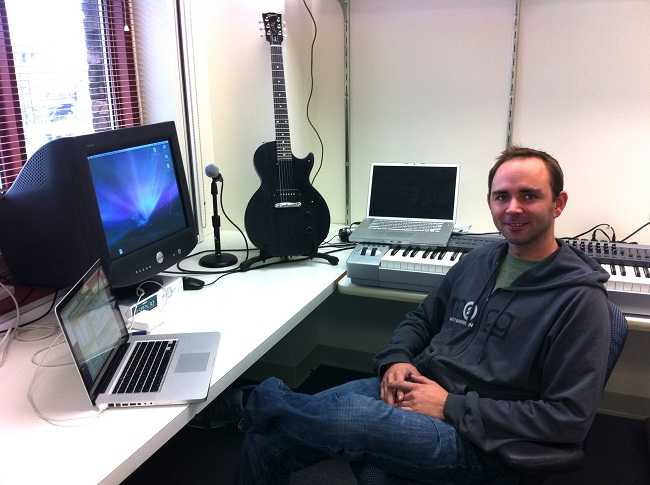Psychologist Gets Bluesy on the Brain

This ScienceLives article was provided to LiveScience in partnership with the National Science Foundation.
Matt Crump is an experimental psychologist who studies cognitive control. He is in his fourth year as a postdoctoral fellow at Vanderbilt University, and has recently accepted an assistant professor position at Brooklyn College. His research looks at how learning, memory and attention processes work together in everyday skills like typing, as well as other tasks like playing musical instruments, such as piano and guitar. In a recently published study, Crump, along with Gordon D. Logan of Vanderbilt University, explored conscious control in various tasks. In his spare time, Crump enjoys playing with synthesizers and painting. See some of his paintings on his website, and his answers to the ScienceLives 10 Questions below.
Name: Matthew CrumpAge: 30Institution: Vanderbilt University, soon to be Brooklyn College Field of Study: Cognitive Psychology
What inspired you to choose this field of study? Finding cognitive psychology was a happy coincidence. My first years of university were spent trying out engineering, jazz, history, and archeology, but none of those topics really clicked. On my Mom’s insistence, I enrolled in a first year psychology class thinking that I would learn how to give people advice. Instead, I met my first mentor, John Vokey. My eyes almost didn’t accept the picture when he walked into class . . . tall, fiery red hair down to his knees, glasses that darken in sunlight. Within minutes he had blown away nearly all of my preconceptions about the field of psychology. He lectured about his research on “thinking” computer algorithms that could simulate how people tell the difference between Monet and Picasso. I joined the lab almost out of disbelief, and haven’t looked back since. Now I get to spend my time thinking about how people think, reading about how other people think we think, and running experiments to make me rethink how I think about thinking.
What is the best piece of advice you ever received? “This is how to play the blues scale on a piano”, changed my life and unlocked a fascination with music and improvisation. On the research side of things, there have been several little tidbits guiding my thinking. “Be skeptical, not cynical” pushes me to become a constructive thinker. “Read charitably” takes off my blinders and biases when I’m reading papers and helps me focus on underlying ideas. “Find a productive level of vagueness” encourages me to strike a balance between diving into the details of an idea without losing sight of the bigger picture. When I was a graduate student I remember sitting down with a friend in the field who was helping me form a research trajectory. He said, “Look, do you want to ride one pony or two ponies? . . . You want to ride two ponies.” I’ve followed the advice and always try to have at least two lines of research. At best you have two prized ponies, at worst you ride the one that works out.
What was your first scientific experiment as a child? I didn’t want any help with my science project for my first elementary school science fair, and it showed. My question was “Can you melt crayons with a car battery?”. The answer is yes. I created a contraption that connected a battery to crayons, and then melted them on pieces of paper.
What is your favorite thing about being a researcher? You get to play with ideas and you get to have mind-changing experiences. My number one favorite thing has to be the creativity involved in working with old ideas, and shaping and creating new ideas. I like the promise that when you are stuck with a problem, there is some different way of thinking that will change the game.
Get the world’s most fascinating discoveries delivered straight to your inbox.
What is the most important characteristic a researcher must demonstrate in order to be an effective researcher?You need some combination of the basics: curiosity, attention to detail, persistence and focus, open-mindedness, enthusiasm, healthy skepticism, supportive colleagues. For me, once you have the basics, the cherry on top is story-telling. The basics could lead you to a wonderful finding, but many findings do not speak for themselves. An effective researcher is always looking for better ways to communicate his or her findings.
What are the societal benefits of your research?My research looks at how components of cognitive processing—like learning, memory, and attention—work together in skilled performance settings, like playing piano or typing on a computer keyboard. For the most part, the research is at a basic science level where the aim is to develop and test theories about how cognitive processes work. However, because I study problems like skilled typing, the findings also hold clues for improving typing speed and accuracy, and more generally for improving interfaces between humans and the tools that they use.
Who has had the most influence on your thinking as a researcher? I’ve had wonderful advisors and colleagues over the years that have shaped my thinking. The short list is Bruce Milliken, John Vokey, Scott Allen, Lorraine Allan, Lee Brooks, Bruce Whittlesea, and Gordon Logan. I can’t thank them enough.
What about your field or being a researcher do you think would surprise people the most?I think people would be surprised at the amount of basic research that has been poured into understanding how minds work. Experimental psychologists have been working hard at understanding minds for well over a hundred years. What never fails to impress me is how early researchers invented clever ways of measuring psychological processes without the benefit of modern technology.
If you could only rescue one thing from your burning office or lab, what would it be?My computer, everything is on it. And, this reminds me, I should probably do another back-up.
What music do you play most often in your lab or car?I like synthesizers, probably too much for my own good. I often search for someone testing out a synthesizer on Youtube and let that play in the background, but when I get bored of listening to the sounds of cats scratching blackboards in outer space, I’ll try to find adventure music that sounds like Nintendo, or maybe just listen to the Theme from Jurassic Park one more time.
Editor's Note: This research was supported by the National Science Foundation (NSF), the federal agency charged with funding basic research and education across all fields of science and engineering. Any opinions, findings, and conclusions or recommendations expressed in this material are those of the author and do not necessarily reflect the views of the National Science Foundation. See the ScienceLives archive.
